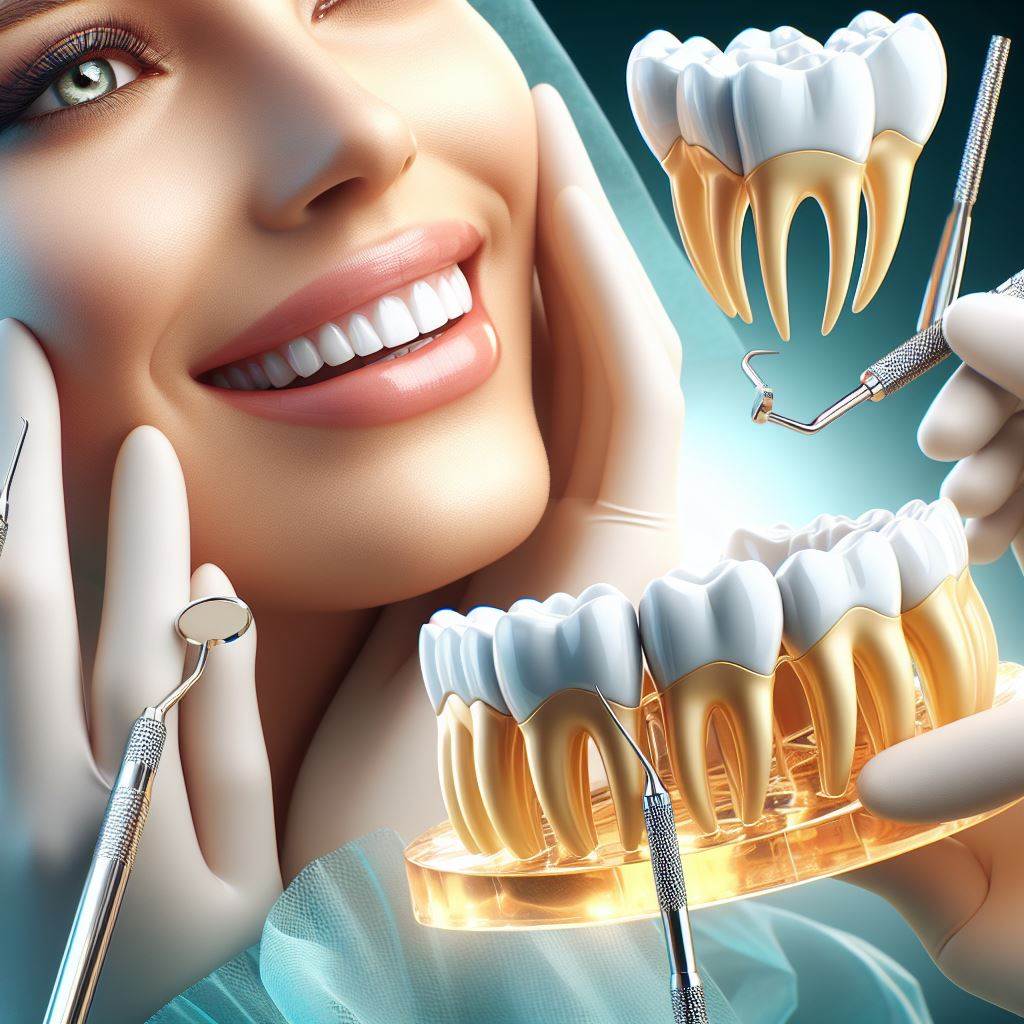In the realm of dentistry, innovations continually arise to enhance both the aesthetics and functionality of our smiles. Among these advancements, dental crowns and bridges stand out as essential tools in restorative dentistry. These prosthetic devices not only restore damaged teeth but also contribute significantly to oral health and overall well-being. Let’s delve into the world of dental crowns and bridges, exploring their benefits and the role they play in modern dentistry.
Understanding Dental Crowns & Bridges
Before delving into their benefits, it’s crucial to understand what dental crowns and bridges entail. Dental crowns, also known as caps, are tooth-shaped covers that are placed over a tooth to restore its shape, size, strength, and appearance. They are commonly used to protect weak teeth, restore broken or severely decayed teeth, or cover dental implants.
On the other hand, dental bridges are prosthetic devices used to replace one or more missing teeth. They consist of artificial teeth (pontics) anchored to adjacent natural teeth or dental implants. Bridges not only restore the aesthetic appeal of a smile but also prevent the remaining teeth from shifting out of position, maintaining proper dental alignment.
The Benefits of Dental Crowns & Bridges
1. Restoration of Functionality: One of the primary benefits of dental crowns and bridges is the restoration of functionality. Damaged or missing teeth can significantly impair biting and chewing abilities, leading to difficulties in consuming food properly. Dental crowns and bridges restore these functions, allowing individuals to enjoy a varied diet and maintain proper nutrition.
2. Enhanced Aesthetics: Beyond functionality, dental crowns and bridges also play a crucial role in enhancing the aesthetic appeal of a smile. Whether it’s covering a discolored or misshapen tooth with a crown or filling the gap left by missing teeth with a bridge, these restorations can dramatically improve the appearance of one’s smile, boosting confidence and self-esteem.
3. Prevention of Further Damage: Dental crowns provide a protective barrier around weakened or damaged teeth, preventing further deterioration. By covering the entire tooth surface above the gum line, crowns shield the underlying tooth structure from decay, cracks, and fractures. Similarly, bridges help distribute biting forces evenly across neighboring teeth, reducing the risk of excessive wear and tear.
4. Maintenance of Dental Alignment: When a tooth is lost, adjacent teeth may shift or tilt into the empty space, leading to misalignment issues. Dental bridges fill these gaps, maintaining the proper alignment of teeth and preventing potential orthodontic problems. This aspect is particularly crucial for preserving the integrity of the bite and avoiding complications associated with malocclusion.
5. Longevity and Durability: Dental crowns and bridges are designed to withstand the pressures of daily chewing and biting. Made from durable materials such as porcelain, ceramic, or metal alloys, these restorations can last for many years with proper care and maintenance. With regular dental check-ups and good oral hygiene practices, patients can expect their crowns and bridges to provide lasting functionality and aesthetics.
6. Versatility in Treatment Options: Dental crowns and bridges offer versatile solutions for various dental issues. Whether it’s repairing a single damaged tooth with a crown or replacing multiple missing teeth with a bridge, these restorations can be customized to meet each patient’s unique needs. Moreover, advancements in dental technology have made it possible to create crowns and bridges that closely mimic the appearance and feel of natural teeth, ensuring seamless integration into the smile.
7. Improvement in Quality of Life: Ultimately, the benefits of dental crowns and bridges extend beyond the realm of oral health. By restoring proper dental function and aesthetics, these prosthetic devices can significantly improve the quality of life for individuals affected by dental issues. Whether it’s enjoying favorite foods without discomfort or smiling confidently in social settings, patients experience a newfound sense of comfort and satisfaction with their enhanced smiles.
The Role of Dentistry and Special Care Dentistry
In the field of dentistry, the importance of dental crowns and bridges cannot be overstated. Dentists play a pivotal role in assessing patients’ dental health, determining the need for crowns or bridges, and performing the necessary procedures with precision and expertise. Moreover, special care dentistry focuses on providing tailored dental solutions for individuals with unique needs, such as those with disabilities or medical conditions that affect oral health. For these patients, dental crowns and bridges offer invaluable restorative options to preserve dental function and enhance overall well-being.
In conclusion, dental crowns and bridges are indispensable tools in modern dentistry, offering a multitude of benefits for patients seeking to restore their smiles and improve their oral health. From restoring functionality and aesthetics to preventing further damage and enhancing quality of life, these prosthetic devices play a vital role in transforming smiles and restoring confidence. With advancements in dental technology and the expertise of dental professionals, individuals can look forward to enjoying the many benefits that dental crowns and bridges have to offer.
By prioritizing oral health and seeking appropriate dental care, individuals can ensure the longevity and success of their dental restorations, enabling them to enjoy a lifetime of healthy smiles.



